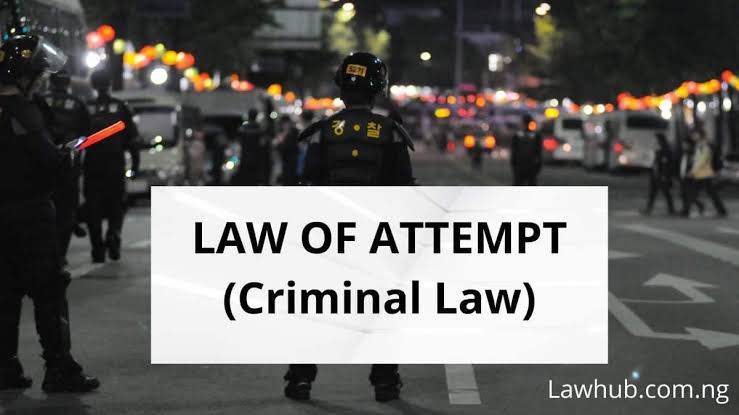N.B. This article is particular to Nigeria.
Law of Attempt
The interest of crime prevention would not be well served if a man intending to commit a crime were to be held innocent until he had actually committed the crime intended. Mere intentions is not criminal, however, where that intentions is put into effect, one maybe guilty even before he achieves his aim. Thus, it is an offence to commit an offence.
THE INTENT.
The prosecution must prove that the accused intended to commit the offence which he is alleged to have attempted. Thus in R. V. Seidu, the accused could not be guilty of attempting to commit rape because he did not intend sexual penetration. This is evident also in R. V. Offiong.
Since section 4 requires prove of intent to commit an offence, it is arguable that the rule of ignorance is not an excuse is excluded by necessary implications. It should be noted that a man cannot be convicted of attempting an offense of strict liability unless he consciously intended it.
THE ACTUS REUS
What sort if act constitutes an actus reus? The question must be approached with caution. Section 4c.c in effect requires 3 elements for the actus reus of attempt.
- That the accused has begun to put his intentions into execution
- That he has not fulfilled his intentions to such an extent as to commit the crime.
- That his intentions be made manifest by some overt act.
English law draws a distinction between preparation to commit an offence & an attempt. The former not usually being sufficient to ground liability, though in certain cases it might be expressly declared to be enough.
In R. V. Button, the accused entered for an athletic meeting and filled in the entry form falsely. It was held that he was guilty of attempt to obtain by false pretense.
In R. V. Robison, on the other hand, a jeweler, tied himself up and pretended that his shop had been burgled. His aim was to collect the insurance money but was arrested before-hand. It was held that There was no attempt.
However, none of this takes us close towards a general theory of attempt. As parke B in R. V. Eagelton stated “some acts is required & we do not think that all acts towards committing a misdemeanor is indictable”
This statement was approved in R v. Robison & applied by the northern high court of appeal in Orija V. IGP. The currently most favored test if attempt is that of Mr. Turner in Orija’s case. Smith J. Describes it as being more practical than that in Eagleton
This is described as the Equivocality test. Turner later modified the test as it was too narrow.
ATTEMPT BY OMMISSION
Section 4 only talks about intention being manifested by overt act. But presumably, it would be possible to convict for an attempted criminal omission, at least where the crime was one of intentions.
ATTEPMTING THE IMPOSSIBLE
It is immaterial in a conviction for an attempt which by reasons unknown to the offenders is impossible to be committed. Thus, a man is only guilty of an attempt if he puts his hands into an empty pocket to steal. If the impossibility is a legal impossibility, then there is no attempt. E,g an infant of seven years cannot legally steal.
Whatever doubts may exist on this matter have been resolved by the house of lords in Haugton V. Smith overruling the decision in R. V. Ring.
ATTEMPT TO PROCURE
If anyone procures another to commit a crime, and that person agrees, then there is a criminal conspiracy. If the act is committed, the procurer is guilty as the principal offender even though the committer of the act be not criminally responsible as provided in Section 513c.c
Contributed by: Abdulganiyu Ismail (AKA) Mastermind
Prepared and Written by: Ucheakonam Chijioke Joshua (CJ)


Leave a Reply